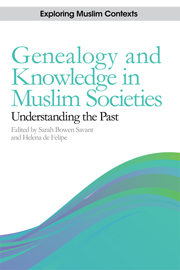Book contents
- Frontmatter
- Contents
- List of Figures and Tables
- Introduction
- Part One The Generation of Genealogical Knowledge
- 1 Keeping the Prophet's Family Alive: Profile of a Genealogical Discipline
- 2 Motives and Techniques of Genealogical Forgery in Pre-modern Muslim Societies
- 3 The Genealogy of Power and the Power of Genealogy in Morocco: History, Imaginary and Politics
- Part Two Empowering Political and Religious Elites
- Part Three Genealogy as a Source for Writing History
- About the Contributors
- Index
3 - The Genealogy of Power and the Power of Genealogy in Morocco: History, Imaginary and Politics
from Part One - The Generation of Genealogical Knowledge
Published online by Cambridge University Press: 05 September 2014
- Frontmatter
- Contents
- List of Figures and Tables
- Introduction
- Part One The Generation of Genealogical Knowledge
- 1 Keeping the Prophet's Family Alive: Profile of a Genealogical Discipline
- 2 Motives and Techniques of Genealogical Forgery in Pre-modern Muslim Societies
- 3 The Genealogy of Power and the Power of Genealogy in Morocco: History, Imaginary and Politics
- Part Two Empowering Political and Religious Elites
- Part Three Genealogy as a Source for Writing History
- About the Contributors
- Index
Summary
In his incisive criticism of Ibn Rushd's views of nobility (sharaf), Ibn Khaldun addressed the significant role of politics and social solidarity in genealogical affiliation (nasab). While for Ibn Rushd nobility belongs to a people or a house (bayt) consisting of ancient settlers in a town and depends exclusively on the number of ancestors and their prominent origins, for Ibn Khaldun nobility refers to a sense of “group feeling” (‘aṣabiyya) and its associated political power and social authority – as “influence among men”. Since nobility is the result of personal qualities and group solidarity, only those “who share in a group feeling” can possess it, while others have it only in a metaphorical and figurative sense, and, hence, the assumption that they are noble is a “specious claim”. Therefore, on every occasion that the group feeling is effaced or even simply weakened, the genealogical nobility loses its socio-political significance and becomes a “delusion”.
Through his argument, Ibn Khaldun tries to elucidate how effective and symbolic aspects of genealogies are entangled with their socio-political dimensions. For him, nasab does not necessarily refer to a historical reality (although it may), and its authority lies in its social, economic and political effectiveness. In fact, Ibn Khaldun's conception of Maghribian and Islamic kinship systems is a part of his thesis concerning taghallub – domination in its broad political, economic and military significance – and ‘aṣabiyya (solidarity).
- Type
- Chapter
- Information
- Genealogy and Knowledge in Muslim SocietiesUnderstanding the Past, pp. 37 - 52Publisher: Edinburgh University PressPrint publication year: 2014



